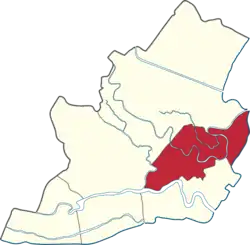La Paz, Iloilo City
La Paz ([laˈpas]) is a district in Iloilo City, in the Philippine province of Iloilo, on the island of Panay, in the region of Western Visayas.[1] It is the third-largest district by land area, after Jaro and Mandurriao. According to the 2020 census, it has a population of 54,720 people. In the past, it was known as Ilawod, which means "sea/wet land," along with Jaro, which was referred to as Ilaya, meaning "mountain/dry land."[2]
La Paz | |
|---|---|
From top, counter-clockwise: La Paz aerial view; WVSU Quezon Hall; La Paz Public Market; Iloilo Sports Complex; La Paz Church | |
 Location within Iloilo City | |
.svg.png.webp) La Paz Location in the Philippines .svg.png.webp) La Paz La Paz (Philippines) | |
| Coordinates: 10°43′12″N 122°34′41″E | |
| Country | Philippines |
| Region | Western Visayas (Region VI) |
| Province | Iloilo (geographically only) |
| City | Iloilo City |
| Congressional District | Lone district of Iloilo City |
| Established | 1584 |
| Incorporated (as district) | July 16, 1937 |
| Barangays | 25 (see Barangays) |
| Government | |
| • Mayor | Jerry Treñas (Mayor of Iloilo City) |
| Area | |
| • Total | 11.33 km2 (4.37 sq mi) |
| Population (2020 census) | |
| • Total | 54,720 |
| • Density | 4,828.57/km2 (12,505.9/sq mi) |
| Demonym(s) | Lapazeño; Lapaznon |
| Time zone | UTC+8 (Philippine Standard Time) |
| ZIP code | 5000 |
| Area code | 33 |
| Patron saint | Nuestra Señora de la Paz y Buen Viaje (Our Lady of Peace and Good Voyage) |
| Feast day | May 24 |
| Native languages | Hiligaynon |
La Paz is famous as the birthplace of the popular Filipino noodle soup dish, La Paz Batchoy. This flavorful dish is known for its rich broth, tender meat, and garnishments such as crushed chicharron (pork cracklings), sliced pork, and liver. La Paz Public Market, considered the birthplace of La Paz Batchoy, is a bustling hub where locals and tourists alike can indulge in this culinary delight.
The district is home to the La Paz District Plaza, the largest among the six district plazas in Iloilo City. The plaza features a spacious football field where games are occasionally held. In front of the plaza stands the red-brick La Paz Church, an architectural gem that adds to the district's charm and historical significance.
History
La Paz traces back to its origins as one of the barrios of Jaro. Initially established in 1584, it was named Bagong Banera at the time. However, it wasn't until 1856 that it gained independence from Jaro and became a separate pueblo (town) known as Lobo.[3] Later on, it was renamed La Paz, meaning "peace" in Spanish, which was derived from its patron saint, Nuestra Señora de la Paz y Buen Viaje (Our Lady of Peace and Good Voyage).
On July 16, 1937, La Paz was incorporated as a district of Iloilo City, alongside the towns of Arevalo, Mandurriao, and Molo. This integration marked its status as an integral part of the expanding urban center.
In 2008, the sub-district of Lapuz in La Paz gained independence after a resolution was passed by the city council. This move aimed to establish separate police and fire stations for the area.[4]
Geography
La Paz is situated in the middle-eastern part of Iloilo City, around 2.1 kilometres (1.3 mi) from Iloilo City Proper. It is bordered by Jaro to the north, Mandurriao to the west, Molo to the southwest, the City Proper to the south, and Lapuz to the southeast. The district is traversed by the Tigum River and faces Buenavista on Guimaras Island across the Iloilo Strait to the east.
Barangays
The district of La Paz has a total of 25 barangays.
- Aguinaldo
- Baldoza
- Bantud
- Banuyao
- Burgos-Mabini-Plaza
- Caingin
- Divinagracia
- Gustilo
- Hinactacan
- Ingore
- Jereos
- Laguda
- Lopez Jaena Norte
- Lopez Jaena Sur
- Luna
- MacArthur
- Magdalo
- Magsaysay Village
- Nabitasan
- Railway
- Rizal
- San Isidro
- San Nicolas
- Tabuc Suba
- Ticud
Culture
La Paz Batchoy

The La Paz Public Market in the district is often referred to as the specific birthplace of the Ilonggo noodle soup dish, La Paz Batchoy. It is a noodle soup made with pork offal, crushed pork cracklings, chicken stock, beef loin and round noodles.[5]
La Paz Fiesta
In honor of the district patron saint of La Paz, Nuestra Señora de la Paz y Buen Viaje (Our Lady of Peace and Good Voyage), La Paz Fiesta, or the Feast of the Our Lady of Peace and Good Voyage, is held annually in the district on May 24.
Education
La Paz is home to two of the eight universities in Iloilo City, namely, West Visayas State University and Iloilo Science and Technology University. Other notable schools in the district are Western Institute of Technology, St. Therese – MTC Colleges, Hua Siong College of Iloilo, and Iloilo National High School.
Transportation
La Paz, like other districts of Iloilo City, is served mostly by passenger jeepneys, white metered taxis, and tricycles within the district. It is also the location of the headquarters of Panay Railways, which operated a railroad from Iloilo City to Roxas City from 1907 to the 1980s.[6]
See also
References
- Panes, Cornelio P. "Iloilo, My City, My Pride". Archived from the original on January 21, 2012. Retrieved February 20, 2012.
- Regalado, Felix B. (1973). History of Panay. Central Philippine University.
- "La Paz Church History". La Paz Church. Retrieved August 7, 2022.
- "City to recognize Lapuz as separate district from La Paz". www.thenewstoday.info. Retrieved August 11, 2022.
- "La Paz Batchoy". Explore Iloilo. Retrieved August 7, 2022.
- "Panay Railways". www.thenewstoday.info. Retrieved August 12, 2022.
.jpg.webp)

.jpg.webp)
.jpg.webp)

